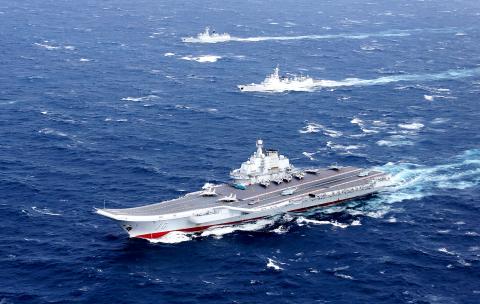The Ministry of National Defense (MND) yesterday said that a flotilla of Chinese military vessels had passed through the Taiwan Strait earlier in the day, heading southward along China’s east coast, after conducting a military exercise near the Japanese island of Miyakojima.
A destroyer, a supply ship and an escort vessel from China’s South China Sea fleet passed through the Miyako Strait — which lies between Miyakojima and Okinawa — into the Taiwan Strait, the ministry said.
The flotilla was traveling west of the median line in the Taiwan Strait and was expected to leave Taiwan’s air defense identification zone by last night, the ministry said, adding that it was closely following the ships’ movement.

Photo: Reuters
The three vessels were returning from an annual naval and air exercise that was conducted on Thursday in an area southeast of Miyakojima, which is about 300km east of Taiwan, the ministry said.
The exercise included drills involving fighter aircraft, early warning and air surveillance aircraft and Xian H-6 bombers, the ministry said.
It said there was no imminent threat to Taiwan, but the nation would continue to keep a close eye on China’s military actions and it is prepared to respond if necessary.
In December last year, China’s first aircraft carrier, the Liaoning, and a flotilla of escort vessels sailed close to Taiwan’s east coast on its way to the South China Sea to conduct training exercises.
On the return leg in January, the flotilla entered Taiwan’s air defense identification zone from the southwest and remained west of the median line of the Taiwan Strait, sailing north to its base in northeastern China.
In response to reporters’ queries, Taiwanese military expert Erich Shih (施孝瑋) said it was difficult to determine whether the aim was to intimidate Taiwan.
China was more likely was trying to gain maritime navigation experience with its military vessels, he said, adding that the targets of the exercises could also have been Japanese or US military bases in the region.

‘DENIAL DEFENSE’: The US would increase its military presence with uncrewed ships, and submarines, while boosting defense in the Indo-Pacific, a Pete Hegseth memo said The US is reorienting its military strategy to focus primarily on deterring a potential Chinese invasion of Taiwan, a memo signed by US Secretary of Defense Pete Hegseth showed. The memo also called on Taiwan to increase its defense spending. The document, known as the “Interim National Defense Strategic Guidance,” was distributed this month and detailed the national defense plans of US President Donald Trump’s administration, an article in the Washington Post said on Saturday. It outlines how the US can prepare for a potential war with China and defend itself from threats in the “near abroad,” including Greenland and the Panama

A wild live dugong was found in Taiwan for the first time in 88 years, after it was accidentally caught by a fisher’s net on Tuesday in Yilan County’s Fenniaolin (粉鳥林). This is the first sighting of the species in Taiwan since 1937, having already been considered “extinct” in the country and considered as “vulnerable” by the International Union for Conservation of Nature. A fisher surnamed Chen (陳) went to Fenniaolin to collect the fish in his netting, but instead caught a 3m long, 500kg dugong. The fisher released the animal back into the wild, not realizing it was an endangered species at

The High Prosecutors’ Office yesterday withdrew an appeal against the acquittal of a former bank manager 22 years after his death, marking Taiwan’s first instance of prosecutors rendering posthumous justice to a wrongfully convicted defendant. Chu Ching-en (諸慶恩) — formerly a manager at the Taipei branch of BNP Paribas — was in 1999 accused by Weng Mao-chung (翁茂鍾), then-president of Chia Her Industrial Co, of forging a request for a fixed deposit of US$10 million by I-Hwa Industrial Co, a subsidiary of Chia Her, which was used as collateral. Chu was ruled not guilty in the first trial, but was found guilty

DEADLOCK: As the commission is unable to forum a quorum to review license renewal applications, the channel operators are not at fault and can air past their license date The National Communications Commission (NCC) yesterday said that the Public Television Service (PTS) and 36 other television and radio broadcasters could continue airing, despite the commission’s inability to meet a quorum to review their license renewal applications. The licenses of PTS and the other channels are set to expire between this month and June. The National Communications Commission Organization Act (國家通訊傳播委員會組織法) stipulates that the commission must meet the mandated quorum of four to hold a valid meeting. The seven-member commission currently has only three commissioners. “We have informed the channel operators of the progress we have made in reviewing their license renewal applications, and